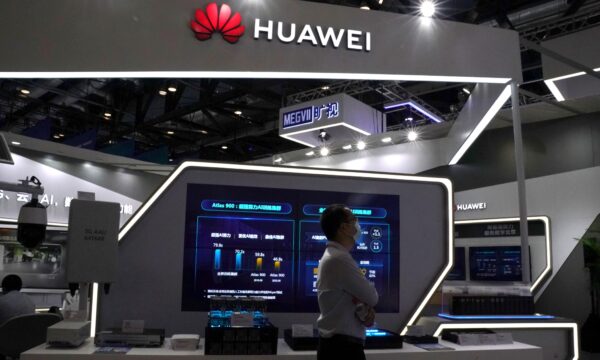By Ella Kietlinska and Joshua Phillipp
Within 15 years, communist China will gain the ability to send military forces to any part of the world in days as a result of its political warfare, according to one of the top experts on the Chinese Communist Party (CCP) and its military agendas.
The CCP’s goal is to become the global hegemon “and all I can say watching them for the last 20 years is that they are making steady progress,” Rick Fisher, a senior fellow at the International Assessment and Strategy Center, told The Epoch Times’ “Crossroads” program.
The CCP has created within the U.S. business sector “a phalanx of allies since the beginning of normalization of relations in the 1970s,” Fisher said, and they helped the CCP to advance its interests within the American Congress and the American government.
This is one form of the CCP’s political warfare, he said.
U.S. policy toward China has changed only recently because of the CCP’s overreach, Fisher said. Technology theft by the CCP has put U.S. companies out of business, for example.
Another form of Chinese political warfare is “pervasive propaganda,” which uses television, print media, computer networks, and mobile apps to push its agenda 24 hours a day, seven days a week, Fisher said.
Cyberwarfare, which is carried out by Chinese companies such as Huawei that dominate the computer and telecommunication component market, is also a part of the political warfare, he said.
These companies try to take control of other countries’ 5G networks and, in the future, 6G networks. The purpose isn’t only to collect data on the global population but mainly to give Chinese intelligence “much greater access to global electronic infrastructure” such as traffic lights and the electric power grid.

While companies such as Huawei are officially private, “there are no private companies in China, as every company has at least one communist party cell that operates in that company,” Fisher said.
Even if a company has only four members, two or three of them will form a CCP cell, he said. The CCP cell in a company “makes decisions, exercises leadership, and makes demands of that company.”
According to Fisher, gaining control over other countries’ infrastructure would allow the Chinese regime to attack or invade a country. If China could turn off all the traffic lights and all power plants in a country, it would be much easier to conquer that country, Fisher said, adding that such tactics wouldn’t be limited to countries bordering China but could be applied to any country in the world.
“Within 15 years, China will have the ability to send marines or air-mobile army forces to any country on earth within a day or two,” Fisher said.
In 2006, the State Department banned computers made by Chinese company Lenovo from U.S. classified networks, due to national security concerns.
The “U.S. government discovered and decided that Lenovo computers contained backdoors and spyware that would allow Chinese intelligence services to exploit whatever access they would have to classified American computer networks,” Fisher said.
There’s also a real concern that “if a voting machine would have Chinese components, it’s at least possible in theory that a bad actor could go to that voting machine, insert a program that would affect the vote count in favor of a friend of China.
“If the machine was connected to a network, then the task of gaining access by Chinese or other actors would be assisted by knowledge of backdoors or other program-related doors that would be built into the Chinese hardware installed in the machine,” he said.
Cellphones, computer hardware, computer chips, and computer screens made in China may be equipped with backdoors that “can then access other parts of a computer or a phone,” Fisher said.
“That is well-established Chinese policy. It is promoted by the Chinese Communist Party. It is promoted by the Chinese People’s Liberation Army. It is the patriotic duty of Chinese companies to follow orders from the military and intelligence organs to create backdoors wherever possible.”
U.S. voting system vendors use some components that come from China. During a congressional hearing in January 2020, the CEO of Election Systems & Software (ES&S) said that “one of the nine programmable logic devices” they use is sourced from a U.S. company that produces the component in its factory in China.
Dominion Voting Systems’ CEO said at that hearing that his company uses components from China such as glass screens or chip components such as capacitors and resistors, in their products. Hart InterCivic’s voting systems also contain capacitors and resistors from China, its CEO said.
CCP’s Ambitions Toward Hegemony
Australia was threatened by the Chinese regime in April after it pushed for an international inquiry into the origin and handling of the CCP (Chinese Communist Party) virus outbreak in Wuhan. China’s Ambassador Cheng Jingye said at the time that the “Chinese public” might boycott Australian products and universities if Australia was to investigate the virus’s origins.
“Australia offers an example and encouragement to the rest of the world that defending your country from Chinese Communist Party predations is a job best done now, not in 10 or 15 years when China can invade you from the air or from the sea,” Fisher said.
The CCP really believes that it is in a power position, and it has no hesitation to punish its critics and to violate the sovereignty of any other country that angers it, Fisher said.
“Australia has been a very visible target of the Chinese Communist Party’s anger.”
“Should the CCP ever achieve economic power or strength sufficiently greater than that of the United States, they will treat the United States the same way they’ve treated Australia,” Fisher said.
Caden Pearson contributed to this report.






